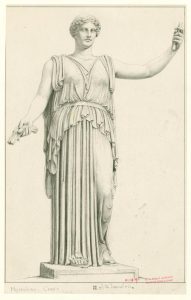The Enigmatic Goddess Demeter: Guardian of the Harvest
Demeter, the ancient Greek goddess of agriculture, grain, and fertility, holds a significant place in mythology and cultural practices. Revered as the nurturing mother of Persephone, her influence extends beyond the fields and into the very essence of life. In this article, we will explore Demeter’s origins, her mythology, and her lasting impact on agriculture and society.
Origins and Attributes
Demeter is one of the Twelve Olympian deities, the daughters of the titans Cronus and Rhea. Often depicted as a mature woman holding a sheaf of wheat or a cornucopia, she embodies the blessings of the earth. Her Roman counterpart, Ceres, shares similar attributes, emphasizing her universal significance.
As the goddess of the harvest, Demeter governs the fertility of the land and the cycle of life and death. She is credited with teaching humanity the art of agriculture, which enabled societies to flourish. Her connection to the earth is profound; she symbolizes the nourishment that sustains both body and spirit.
The Myth of Demeter and Persephone
One of the most compelling aspects of Demeter’s mythology revolves around her relationship with her daughter, Persephone. According to the myth, Hades, the god of the underworld, abducted Persephone to be his queen. In her grief, Demeter searched the earth for her daughter, neglecting her duties and causing crops to wither and famine to spread.
The gods, witnessing the devastation, intervened. Zeus, the king of the gods, eventually negotiated a compromise: Persephone would spend part of the year with Hades and the other part with Demeter. This cycle explains the changing seasons—when Persephone is with Hades, Demeter mourns, and winter prevails. When they are reunited, spring blossoms, and the earth becomes fertile once more.
This myth not only illustrates the bond between mother and daughter but also reflects the agricultural cycle. Demeter’s sorrow brings winter, while her joy leads to the abundance of spring and summer.
Demeter’s Cult and Worship
Demeter was worshipped across ancient Greece, with significant cult centers in Eleusis, near Athens, and in Sicily. The Eleusinian Mysteries, one of the most important religious rites in ancient Greece, were held in her honor. These mysteries celebrated the cycle of life and death, emphasizing the promise of resurrection and abundance.
During the ceremonies, initiates would participate in secret rituals that symbolized the death and rebirth of Persephone, reinforcing the themes of renewal and fertility. The Mysteries attracted people from all walks of life, highlighting Demeter’s universal appeal.
Demeter in Art and Literature
Demeter’s influence extends to ancient art and literature, where she is often depicted in sculptures and paintings. Artists portrayed her with symbols of fertility, such as the cornucopia and poppies, representing both the bounty and the fleeting nature of life.
In literature, she appears in various works, including Homer’s “Hymn to Demeter,” which details her search for Persephone. This hymn emphasizes her maternal love and the consequences of her grief, offering insight into the human experience of loss and longing.
The Legacy of Demeter
The legacy of Demeter is not confined to ancient times. Her themes of fertility, nurturing, and the cyclical nature of life resonate in modern society. Agricultural practices today still reflect the principles she embodied, as farmers rely on the earth’s cycles to produce food.
Moreover, Demeter’s connection to the changing seasons serves as a reminder of the importance of environmental stewardship. As we face challenges such as climate change and food security, her story encourages us to honor the earth and cultivate a sustainable relationship with nature.
In contemporary culture, Demeter has also become a symbol of motherhood, representing the nurturing aspects of femininity. Her myth continues to inspire literature, art, and even modern spiritual practices, reaffirming her timeless relevance.
Conclusion
Demeter, the goddess of the harvest, stands as a powerful symbol of life, fertility, and the profound bond between a mother and her child. Her mythology offers valuable lessons about the cycles of life and the importance of nurturing both the earth and our relationships. As we reflect on her legacy, we are reminded of the interconnectedness of all life and the enduring strength of maternal love.
In a world increasingly disconnected from nature, Demeter invites us to reconnect with the earth, appreciate its bounty, and honor the cycles that sustain us. Through her story, we find inspiration to cultivate not only our gardens but also the relationships and values that nourish our souls.
